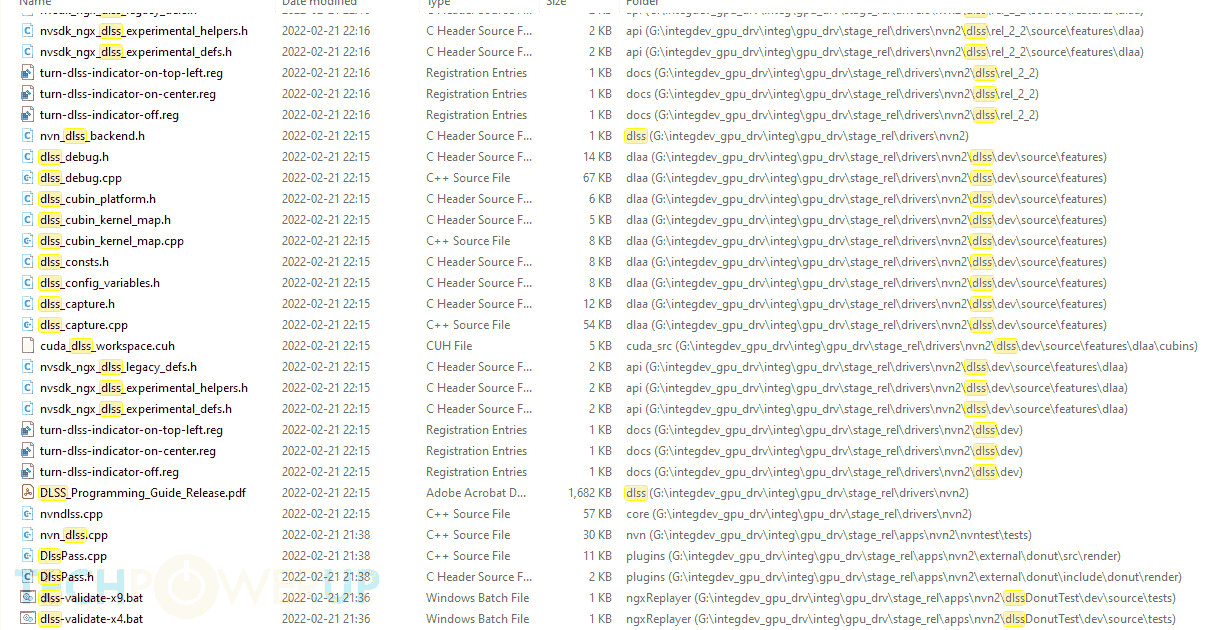Nvidia Comments as Hackers Threaten to Release DLSS Code
Source code for Nvidia's Deep Learning Super Sampling (DLSS) technology has been made available by hackers, asserts a TechPowerUp reader. The claims are backed up by a screenshot (see how to take screenshots in Windows) showing part of a directory listing full of files, consisting of many aptly named C++ code and resource files (see image below). Still, we have to caution that we cannot verify the information, so take it with a grain of salt. This is further fallout from the big Nvidia hack we reported on last week.
Above, you can see what is presented as part of the Nvidia hack swag by the hackers. Presumably, the files are available to people willing to pay. The hacking group called Lapsus$ seems to be entirely money motivated, but yesterday it seemed that they were focused upon selling bypass software for Nvidia's LHR (Lite Hash Rate) mining performance limiter. So we were slightly puzzled by the hackers threatening to release an LHR killer while at the same time asking Nvidia to remove the limiter. Lapsus$ said that if Nvidia removed the limiter, it would return an undistributed "HW folder" of stolen data to the firm.
The screenshot of a DLSS v2.2 source directory reveals nothing much in itself. It is unlikely it could even provide outline clues to how DLSS works. The DLSS Programming Guide PDF might be juicy for developers of rival technologies, but that assumes it is an internal Nvidia document and isn't just a standard guide given to the thousands of game developers worldwide. Lastly, one must question who the DLSS source code would be of value to – competitors such as AMD and Intel surely wouldn't touch it.
Another info nugget that seems to have emanated from the hack regards Nvidia's GPU codenames. Earlier today, we reported that the Lapsus$ info haul indicates the mathematician to be honored after Hopper will be David Harold Blackwell.
Nvidia Plays Down Data Theft
In our report yesterday, it was still hard to be absolutely sure the hacker's claims of snatching 1TB of important data were genuine. However, Nvidia has since expanded upon its earlier minimal and non-committal statement that it was "investigating an incident."
In a new statement seen by HardwareLuxx, Nvidia is quoted as saying, "On February 23, 2022, Nvidia became aware of a cybersecurity incident which impacted IT resources. Shortly after discovering the incident, we further hardened our network, engaged cybersecurity incident response experts, and notified law enforcement."
Nvidia says that it knows some "employee credentials and… proprietary information" was stolen but asserts that it doesn't anticipate any business disruption or customer service impact.
Get Tom's Hardware's best news and in-depth reviews, straight to your inbox.

Mark Tyson is a news editor at Tom's Hardware. He enjoys covering the full breadth of PC tech; from business and semiconductor design to products approaching the edge of reason.
-
hotaru.hino I don't think there's anything of real value in the source code either. Maybe there's some optimizations here and there or some other NVIDIA secret sauce that only works on their hardware, but the real value of AI is the model they're using to do the training/processing.Reply
It's like saying you have the source code to an encryption method. I mean, it does open it up for people to see if there's some flaw with the design, but if it's fine otherwise, the algorithm is worthless. It's the key to decrypt whatever's encrypted that's valuable. -
blppt How would this be of any use to AMD and Intel since neither have the tensor cores required to run it?Reply -
spongiemaster Reply
It wouldn't, and you can bet the legal departments of competing companies are sending out memos to all their employees to not even think about looking at any of the released code from this hack. Open source can't use it, so all the code is pretty much useless. Maybe some Chinese company could use it, but even they aren't going to pay for it, so the hackers aren't going to get anything out of this.blppt said:How would this be of any use to AMD and Intel since neither have the tensor cores required to run it? -
cryoburner ReplyLapsus$ said that if Nvidia removed the limiter, it would return an undistributed "HW folder" of stolen data to the firm.
What good is "returning a folder"? That still provides zero guarantee that they won't sell it to some interested party after the fact. That data is as good as leaked already, so there wouldn't be much point in following any demands.
Another company wouldn't necessarily need the same hardware to take advantage of improving their own competing solutions based on Nvidia's algorithms. Many parts of these routines are likely being performed on standard GPU hardware. And while AMD and Intel might have already put work into their own upscaling routines, there are other companies in regions with less protections over intellectual property that might gain more benefit from the code. And of course, if the other stolen data includes details on hardware designs, that could potentially be of more benefit to the competition.blppt said:How would this be of any use to AMD and Intel since neither have the tensor cores required to run it? -
blppt ". And while AMD and Intel might have already put work into their own upscaling routines, there are other companies in regions with less protections over intellectual property that might gain more benefit from the code. And of course, if the other stolen data includes details on hardware designs, that could potentially be of more benefit to the competition. "Reply
As far as I know, AMD won't be releasing its actual DLSS equivalent until the 7xxx series, which will have tensor core equivalents. But for that to happen, they already have to be well underway with their own codebase by now.
